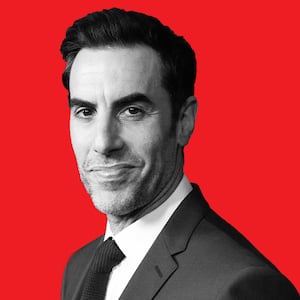Subscribe to The Last Laugh on Apple Podcasts
“If they’re not laughing, it’s not funny.”
That has always been Sacha Baron Cohen’s mantra when it comes to creating comedy. And while his most recent project, the Golden Globe-nominated Showtime series Who Is America? did a lot more than just make viewers laugh, he never loses sight of that primary objective.
Case in point is the interview he conducted last year with former vice presidential candidate Sarah Palin, with him in character as right-wing conspiracy theorist Dr. Billy Wayne Ruddick Jr. PhD. Even after Palin outed herself as one of his victims, giving the show more publicity than Baron Cohen could have ever asked for, he decided to cut her segment from the show.
Why? It simply wasn’t funny enough.
“Just like her candidacy for vice president, she wasn’t good enough to make the show,” Baron Cohen told me during our interview in front of a live audience at the SAG-Aftra Foundation, which you can hear in full on this week’s episode of The Last Laugh podcast.
The British comedian behind the iconic characters Ali G, Borat and Brüno is a relentless perfectionist. And he has never worked harder than he did for Who Is America?, creating six brand-new characters, each requiring heavy prosthetics to conceal his identity and convincing everyone from Dick Cheney to O.J. Simpson to sit down with him unwittingly for deeply revealing and often embarrassing conversations.
Before the show premiered last summer, Baron Cohen said he “didn’t want to do any publicity, mainly out of laziness.” He was also worried that some of the people he had ensnared would take legal action to stop the show from coming out.
Palin was the first to emerge and say she had been “duped,” writing on Facebook, “I join a long list of American public personalities who have fallen victim to the evil, exploitive, sick ‘humor’ of the British ‘comedian’ Sacha Baron Cohen, enabled and sponsored by CBS/Showtime.” That opened the floodgates for other notable names to do the same.
“She was going around the talk shows and talking about how outrageous it was that we put her in the show and saying, this is disgusting and it’s on Showtime at 10 o’clock Sunday nights,” Baron Cohen told me. “She was literally promoting a show that she was not in. And I had this dilemma, which was I didn’t want to reveal that she wasn’t in the show and yet part of me wanted to correct her, because she was spreading some misinformation, which I know is quite a popular thing to do now.”
“And I was particularly worried, because obviously Ms. Palin is known for her factual accuracy,” he joked. “I mean, she was saying that I was a disgusting person, she mistakenly accused me of imitating a veteran, but the problem was the interview wasn’t very good.”
For the type of interview he conducts in character to work, he explained, “you need someone to fully engage and answer the questions,” but Palin “sort of gave these rote answers as if she was on a presidential campaign.”
When I interviewed Borat and Brüno director Larry Charles earlier this year, he attested to Baron Cohen’s incredibly high standards. “The first cut of Borat is six hours long,” he told me. “And I’m telling you right now that you would love it. We did scenes for Borat that I thought were brilliant. They weren’t the funniest scenes necessarily, but they were shocking, freaked-out scenes. And if they didn’t get that laugh quotient, he would not want to use it. And a lot of those scenes fell by the wayside.”
Given how much publicity Palin gave the show—and how much people seemed to be clamoring to see her appearance—Baron Cohen admits that he felt the “pressure” to include it.
“Showtime put quite a lot of pressure on, saying, everyone’s talking about this, you’ve got to put it in,” he said. “And I was saying, it’s not funny, I’m not putting it in. Then a few days would pass and they’d say, you’ve got to put it in, everyone’s talking about it.”
“But ultimately, I was not that concerned with how many people would see the show,” Baron Cohen added, acknowledging that a comment like that will probably make him “unemployable” in the entertainment business. “I was more concerned with the quality of the show,” he added, “so I didn’t really want to compromise with something that was a five-out-of-10 just to do it for the PR.”
Of course, he had to acknowledge it in some way on the show. So he decided to give Palin a credit in the finale. Her role: “Special Publicity Consultant (Inadvertent).”
Subscribe to The Last Laugh podcast to hear our full conversation. New episodes released every Tuesday.









